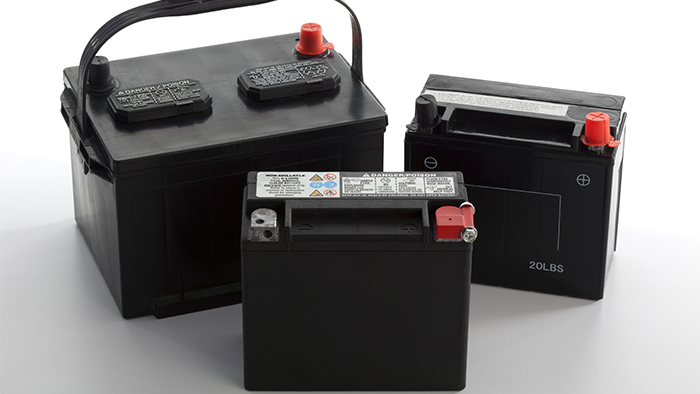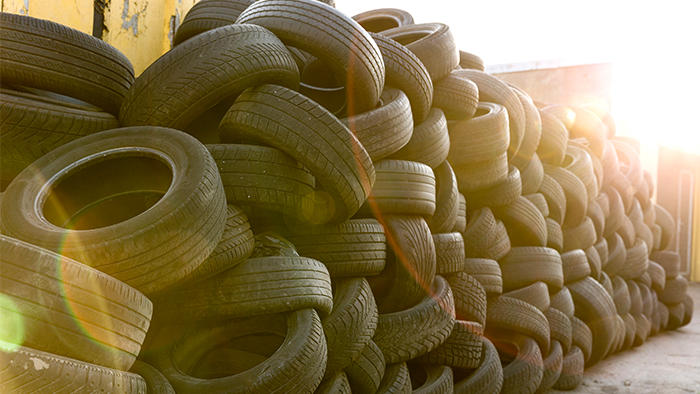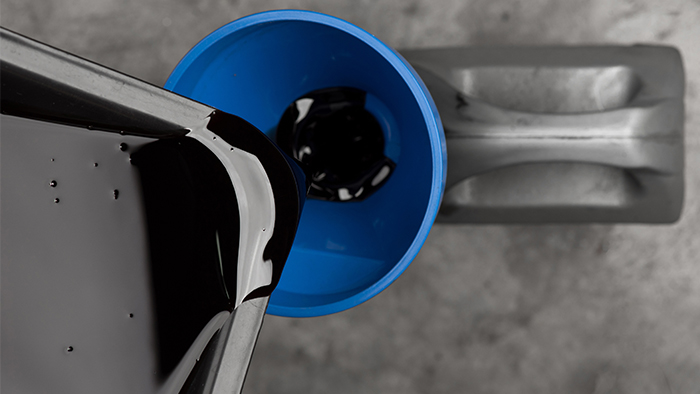Vehicles Sales, Maintenance, and Products
This area covers retail sales of all types of vehicles (automobiles, ATVs, and watercraft), vehicle service and repair shops including vehicle washes, and the sale of automotive-related products such as batteries, cleaning products, fluids/additives, light bulbs, tires, and spare parts, plus similar marine-related products.
COMPLIANCE CONSIDERATIONS
The main environmental compliance issues associated with vehicle sales and maintenance are waste and recycling (hazardous waste management as well as other wastes and recyclables such as used oil and scrap tires), petroleum storage tanks, wastewater, and vehicle emissions standards.
Waste is also one of the main environmental issue related to sales of automotive products. This includes hazardous waste and the storage and recycling of used tires, oil, and batteries.
Some products typically sold in automotive related stores have additional regulations related to VOCs and chemicals. The RCC Product Compliance Toxics Page has more information on products that may be regulated and the RCC VOC matrix has information on allowable VOC limits in products such as brake cleaners, windshield washer fluid, and engine degreases by state.
Hazardous Waste Management
There are a number of hazardous wastes associated with vehicle maintenance and sales including fuels, solvents, aerosols, paints, and some cleaning products. Facilities generating hazardous waste must manage their wastes in accordance with the federal hazardous waste requirements as well as state and sometimes local requirements. The RCC Hazardous Waste page has more information on the management of hazardous waste. Some wastes commonly resulting from vehicle maintenance and sales activities are discussed below.
Aerosol Waste Management
Aerosol cans with a flammable propellant or contents that are flammable or otherwise hazardous may be considered a hazardous waste. In some states, an empty can may be considered a reactive waste and therefore a hazardous waste unless it has been punctured or crushed. However, if you do puncture or crush aerosol cans, that activity may be regulated, and the residual contents must be collected and managed appropriately, possibly as hazardous wastes. In a few states, aerosol cans can be treated as universal wastes. Aerosols can be recycled, but hazardous waste regulations may need to be followed.
Under the Clean Air Act Nonessential Products Ban, most aerosol products that use chlorofluorocarbons (CFCs) or hydrochlorofluorocarbons (HCFCs) as propellants are banned from sale in the US.
Aerosols As Universal Waste
View MatrixAntifreeze
Most antifreeze contains ethylene glycol, which is toxic to humans and animals. It has a sweet taste, so animals can be attracted to spills. Used antifreeze may be contaminated with heavy metals such as lead, cadmium, and chromium, and therefore may be considered a hazardous or special waste.
Antifreeze should never be dumped on land, down the storm sewer, or in water. Ethylene glycol can be recycled, which is the best disposal option for waste antifreeze. There are less toxic alternatives to ethylene glycol, including propylene glycol (although after it is used, it might be a hazardous waste because of metals contamination). Antifreeze may also be regulated at the state level.
Batteries

Standard lead-acid vehicle batteries are considered hazardous wastes, but most are managed in accordance with special standards (federal standards are in 40 CFR Part 266, Subpart G; most states have similar standards) if they are going to be reclaimed. Almost all lead-acid batteries can be recycled through battery suppliers or other authorized haulers. Lead-acid batteries not managed under 40 CFR Part 266, Subpart G can be managed as universal waste in most states. If managed as universal wastes, the used or waste batteries or the container for the batteries, must be labeled or marked clearly with any one of the following phrases: "Universal Waste -- Battery(ies)," or "Waste Battery(ies)," or "Used Battery(ies)." Such batteries generally must not be stored onsite for more than a year.
Lead-acid batteries with cracked or damaged housings should be stored in compatible containment, such as a plastic spill pallet or tote. Spill kits with acid neutralizers should be readily accessible near all battery storage areas, and store personnel should be trained in safe clean up procedures.
Hybrid and electric cars use nickel–metal hydride (NiMH) or lithium ion batteries rather than the traditional lead-acid batteries. These batteries may also be considered hazardous waste. Many of these batteries can be recycled or taken back by the manufacturers. As hybrid and electric cars are relatively new, most car batteries have not reached the end of their life yet, and the waste battery management infrastructure is still being developed.
Refrigerants
Refrigerants are the chemicals used in the vehicle's air conditioning system. Federal Clean Air Act regulations make it illegal to vent refrigerants to the environment during repair, service, maintenance, recycling, or disposal of air conditioning equipment, and refrigerants must be recovered. Spent refrigerants are generally classified as wastes, but may be excluded from hazardous waste regulation if reclaimed for reuse. Filters from reclaiming the refrigerants may still be regulated as hazardous wastes. EPA-certified refrigerant recycling equipment must be used when servicing motor vehicle air conditioners. Anyone who works on vehicle air conditioning systems must also be certified by an EPA-approved organization. Each facility must either have a certified person onsite or bring in a person certified to perform any service involving refrigerant, including refrigerant top-offs.
More information is available on EPA’s Motor Vehicle Air Conditioning Systems page and the RCC Refrigerant Fact Sheet.
Refrigerant Fact Sheet
View Fact SheetScrap Tire Management
Scrap tires are regulated primarily at the state and local level. Most states have landfill bans on scrap tires, effectively requiring them to be recycled. A few common requirements or elements in state used tire programs include taxes or fees on automobiles or tires to fund scrap tire programs, scrap tire market development activities, licensing or registration requirements for scrap tire haulers or processors, manifests for scrap tire shipments, and tire pile elimination activities. Retailers are often required to keep records and file annual reports on used tire recycling. The RCC Other Regulated Waste page has additional information.
The storage of scrap tires is frequently regulated by fire codes and local health regulations. Because stagnant water in used tires is a breeding place for mosquitos, health regulations to prevent the spread of mosquito-borne illnesses frequently require tires to be stored under cover and protected from precipitation. Fire and building codes frequently restrict the location and number tires stored.

Solvent Waste Management
Used solvents from cleaning oil and grease from auto parts such as acetone, benzene, methyl ethyl ketone (MEK), and mineral spirits from parts washers are typically considered hazardous wastes because of contamination and/or flammability/toxicity of the solvent. Waste biodegradable or citrus-based solvents may be hazardous wastes because they may be tainted with heavy metals or other contaminants. Solvent wipes or rags are conditionally excluded from federal hazardous waste regulation, subject to certain conditions, but state rules may vary. The RCC Hazardous Waste page has more information.
Used Oil

Used oil includes nearly any refined crude oil or petroleum based product or a synthetic substance used for lubrication, heat transfer, or hydraulic fluid. Typical used oil products are crankcase oil, brake fluid, power steering fluid, gear oil, and grease. Used oil can be recycled if it is not mixed with other materials. If the used oil is mixed with other materials such as antifreeze, kerosene, or solvents, then it may be hazardous waste. Recycling is the best way to manage used oil.
Bottom clean-out waste from fuel and used oil storage tanks, fuel spill cleanup materials, or other oily wastes may not be considered used oil and are frequently considered hazardous waste.
There are general regulatory housekeeping practices that maintenance and repair facilities must follow when generating used oil. The practices cover safe handling of used oil to maximize recycling and to minimize disposal. The following handling requirements are common to all facilities generating used oil. States may have stricter requirements.
- Label all containers and tanks as "Used Oil"
- Keep containers and tanks in good condition. Don't allow tanks to rust, leak, or deteriorate. Fix structural defects immediately.
- Never store used oil in anything other than tanks, drums, or other storage containers.
- Storage of used oil in lagoons, pits, or surface impoundments is prohibited.
EPA has a Managing Used Oil: Frequently Asked Questions for Businesses page with more details.
In many states, a retailer of new motor oil must either accept used oil from the do-it-yourself or DIY public, or provide information on the nearest DIY public collection location. This can range from providing the information on web sites to posting signage at the shelf on the retail floor.
Used Oil Filters
Used oil filters must be drained thoroughly to remove the used oil, and the oil must be managed as described above. "Non-terne" filters managed by one of the following methods are not considered hazardous waste:
- Puncturing the filter anti-drain back valve or the filter dome end and hot-draining
- Crushing and hot draining
- Dismantling and hot draining
- Any other equivalent hot-draining method which will remove used oil
Because of their lead content, terne-plated used oil filters are considered hazardous waste, even if drained. The preferred method of managing drained used oil filters is by recycling.
Petroleum Product Storage Tanks
Many facilities store petroleum in tanks onsite. These tanks are covered by a variety of state and federal regulations, including requirements to prevent or limit spills. The RCC resources below have more details on the regulations.
Wastewater Management and Floor Drains
While performing maintenance on a vehicle there is the potential for liquids such as oils and fuel to drip. It is important to clean up spills immediately and determine if the cleanup material is a hazardous waste. Understanding the drainage of the facility and knowing where these liquids will go once spilled is imperative to managing wastewater generated at the site so that nothing enters storm drains or local water bodies. Used oil or other automotive fluids should never be discharged to storm sewers, drainage ditches, septic tanks, or streams. Floor drains in vehicle service and installation bays must drain to the sanitary sewer and never to the ground or to storm sewers. To comply with state plumbing code and local sewer utility regulations, installation or service areas frequently must have their floor drains plumbed to oil water separators, which capture oil and grit from vehicles. For more information, visit the Oil Water Separator section of RCC's Water page.
Vehicle Washing
Drains from vehicle washing areas must go to the sanitary sewer for treatment, not stormwater drains. Do not wash vehicles near stormwater drains or allow vehicle washing wastewater to enter the storm drains. Drier areas of the country may have water reuse regulations. Most municipalities have a pretreatment program and require car washes to have a permit and perform some type of pretreatment such as discharging through a sand filter and oil water separator before discharging to the sewer system.
Vehicle washing may also be regulated at the state level and some states may require closed loop vehicle washing systems that do not discharge any wastewater.
Vehicle Sales
The EPA sets emission standards for light-duty vehicles and trucks in the US to limit the emission of greenhouse gases (GHGs) and other pollutants. GHGs contribute to climate change, and vehicle emissions can also contribute to smog and poor air quality. The RCC Air Page and Products Compliance Page have more information.
Smaller nonroad vehicle, such as ATVs, mowers, forklifts, boats, and other gas powered equipment, have federal and, in some cases, state emission standards. It is important to have a management system in place to prevent the shipment of vehicles that are compliant in one state to a state where they do not meet the emissions standards.
Another environmental consideration when selling cars is managing the disposal or recycling of trade-in vehicles.
SUSTAINABILITY
There are some green alternatives to common auto repair products. Bio-based products are commercial goods determined by the U.S. Department of Agriculture (USDA) to be composed in whole or in significant part of biological products, forestry materials, or renewable domestic agricultural materials, including plant, animal, or marine materials.
Maintenance facilities can also reduce some of the compliance burden, by switching to a non-hazardous solvent or detergent based parts cleaner.
Related Content
Spill Reporting Matrix
Summary of state requirements for reporting spills of oil or hazardous substances, including reporting quantity and contact information.
Hazardous Waste Variations by State Matrix
Overview of state variations in hazardous waste regulations under RCRA, including hazardous waste characteristics, thresholds, and universal waste.
Aerosols As Universal Waste Rule Tracking Matrix
State-by-state tracking of adoption of the EPA rule to list aerosol cans as universal waste.
Tags
-
Air
-
Energy
-
Hazardous Waste
-
Solid Waste
-
Storage Tanks
-
Water



